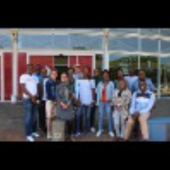
Abstract: Reporting to the public on climate change impacts, adaptation, and mitigation requires journalists to be equipped to engage with a wide range of technical content in order to communicate it in an accessible and engaging way. Recognizing the need for journalists from a wide range of backgrounds, including those from community newspapers and radio stations in South Africa, to be able to undertake this task, the South African Department of Environment Affairs in partnership with GIZ commissioned the authors to develop and deliver a four-day climate change reporting training programme. This paper presents an overview of the structure and content of the course, and details the reflections after undertaking such an endeavor.
Based on the lessons learned, and an awareness that this kind of training may take place in the context where working community-level journalists may have a low knowledge base (of both the journalistic craft, as well as the content of climate science) the following recommendations emerge: scientific training may need to be combined with basic journalistic training (depending on the participants); learning-by-doing is central to journalists building their capacity in climate reporting training; and mother-tongue delivery of material is critical to the success of such technical training courses.
Abstract: With apparel and textile production finding itself a leader in social and environmental responsibility issues, the call to action to influence purchase intention for sustainable and responsible apparel is necessary to both the environment and humankind. Literature supports the connection between consumer knowledge of social issues within the apparel and textile industry and purchase behavior. Cowan and Kinley (2014) identify attitudes as the strongest predictor for purchasing environmentally sustainable apparel. This study looks at the interjection of a type of popular and accepted medium, film, as a possible catalyst to knowledge and attitude change in millennial consumers regarding responsible apparel. This is an exploratory quantitative research study to explore possible future directions of how to impact sustainable purchase intentions of millennials in a consumer driven society. A total of 128 participants from a large Midwest university took part in the study during spring and fall 2016. This study found that millennial consumers had significant change in their purchasing behavior regarding responsible apparel. They also considered themselves more knowledgeable regarding the topic. However, their change in attitudes was not towards being more concerned with what was happening in the industry nor their willingness to sacrifice price and style for responsible apparel.
Continue Reading
Abstract: This article describes an innovative, grant-funded symposium for creative social stewardship that sought to blend the triad of art, education, and the natural environment through a focus on socio-cultural sustainability and community engagement. The purpose of this article is to share foundational information related to the origins of the symposium, describe the tenants of community arts initiatives, feature a session snapshot, and discuss the value of creative social stewardship as a part of daily practice. We conclude by making recommendations for future endeavors in cultivating creative social stewardship conferences or initiatives, ultimately promoting the idea that collaborative, community-based and arts-focused events might inspire reflection on connection, nature, and creativity in ways that nurture sustainability.
Continue ReadingAbstract: Is it important to educate the media on sustainability? This paper debates the need for sustainability education to be nurtured among media practitioners in Malaysia. Media play a vital role in educating society in three main areas of sustainability including environment, economy, and social justice. In this paper, six media practitioners from two local Malaysian printed media organizations, The Star and Utusan Malaysia, were interviewed to gauge their understanding on sustainability education, perceptions on their pivotal role in sustainability education, and the challenges they face in the process of educating society about sustainability issues. The findings of this study show that most Malaysian media practitioners displayed a clear understanding about sustainability education and they also realized their responsibility for not only informing but also educating society about sustainability issues and the importance of sustainable lifestyles. The ultimate challenge the media faces in terms of sustainability education comes from the media organizations themselves, such as the existence of gatekeepers who control the news. Overall, this study demonstrates that the Malaysian media’s involvement in sustainability education is no longer a myth. We hope that this study may provide direction in sustainability education not only among the Malaysian printed media, but also for developing and Southeast Asian countries, and the rest of the world.
Continue Reading